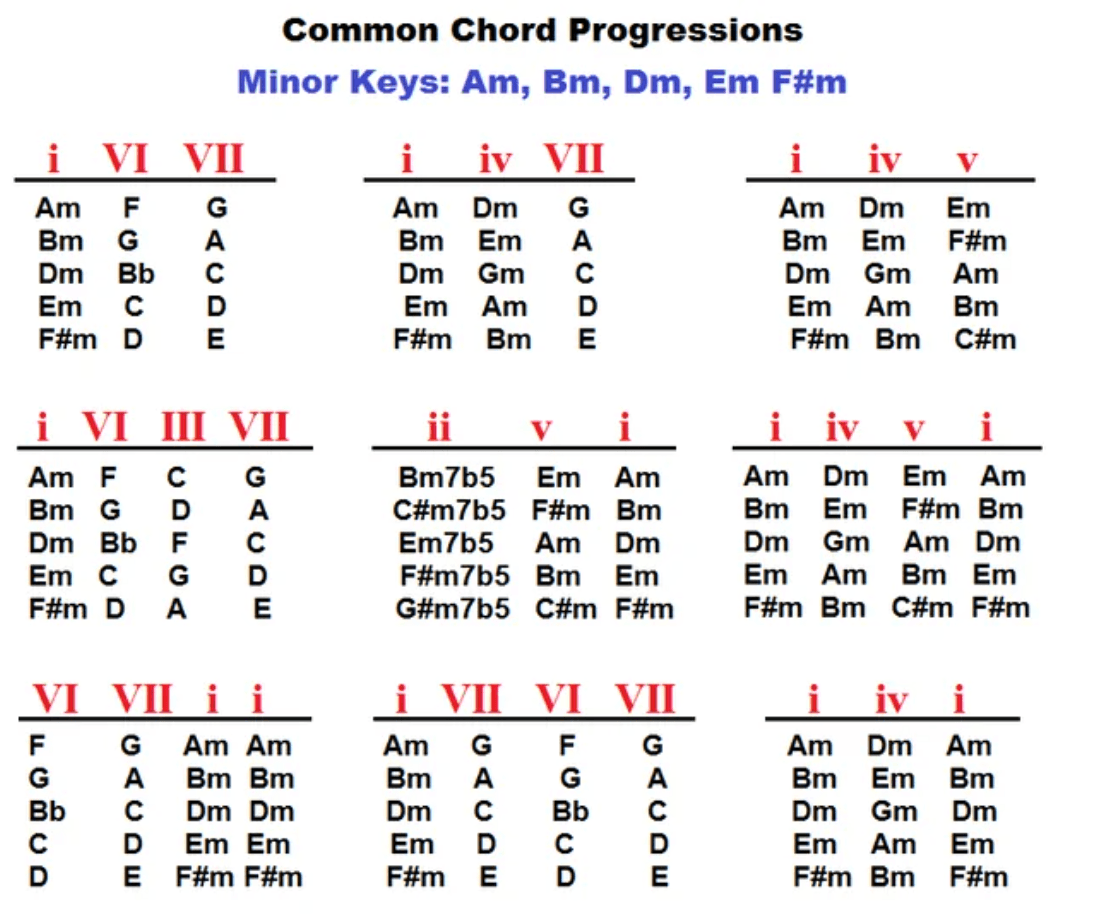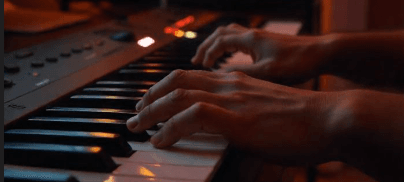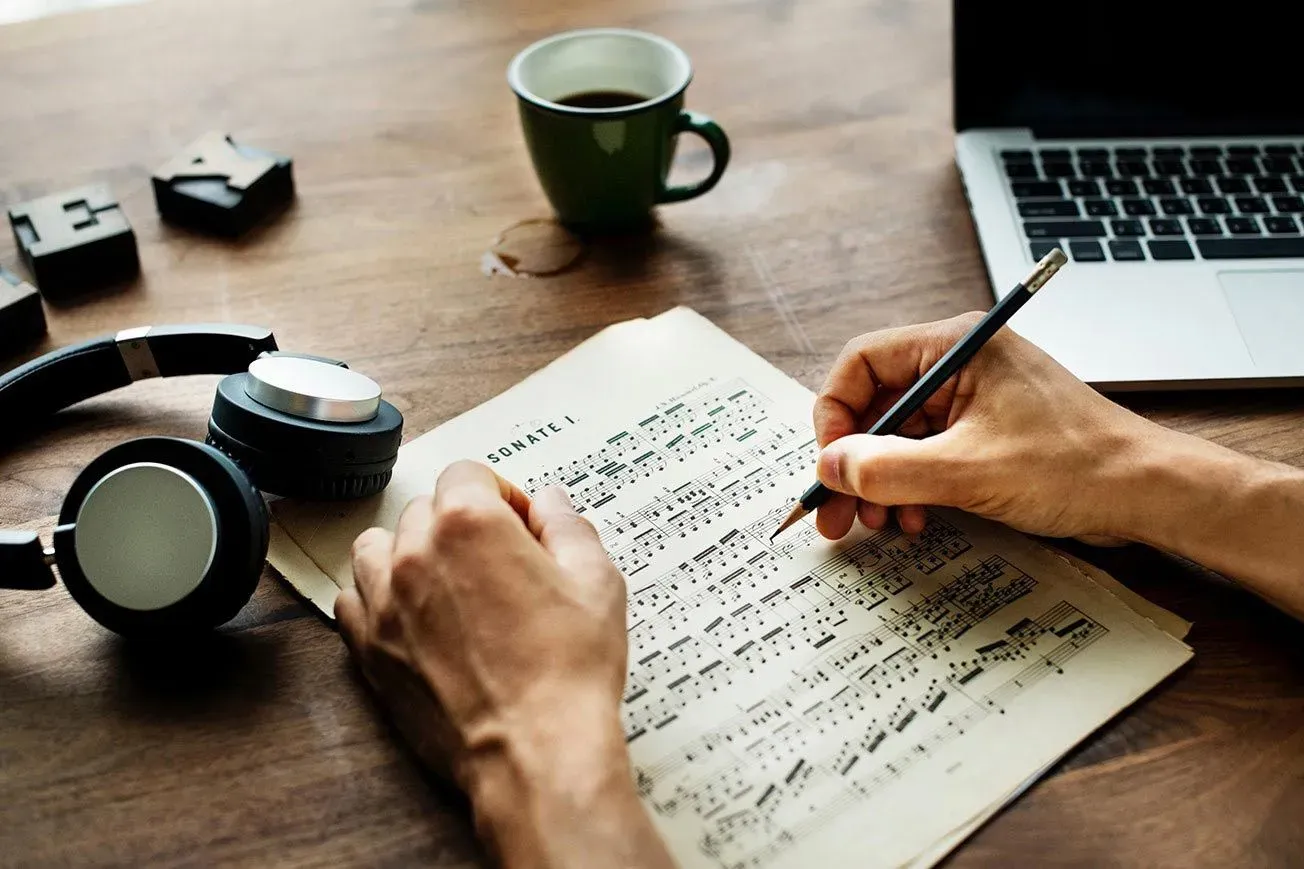In the dynamic world of music, a transformation is quietly taking place, guided by the intriguing possibilities of Artificial Intelligence.
It's a journey that complements traditional methods, offering fresh avenues for musical exploration.
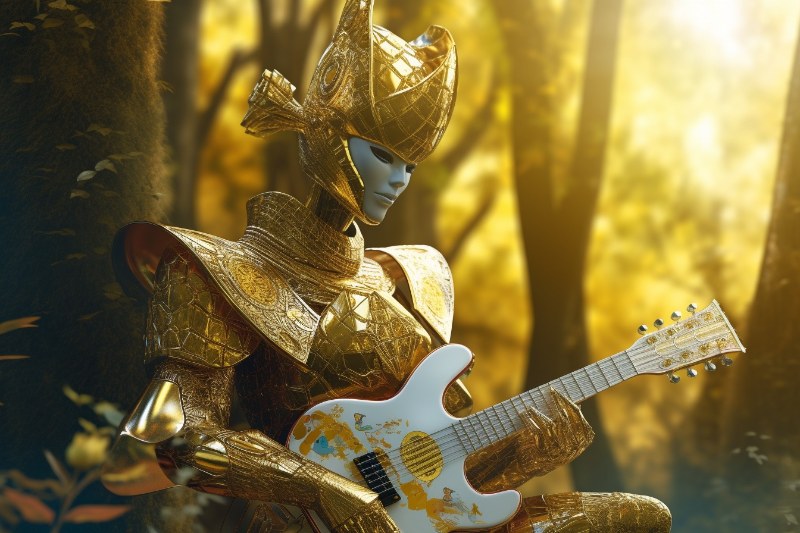
Early Years of AI in Music
The introduction of Artificial Intelligence into the music industry can be traced back to the mid-20th century, a period when AI was still in its early developmental phases.
During these initial years, AI was more of an intriguing experiment than a fully established creative presence in the music world. Its capacity for music composition and innovation was yet to be fully harnessed.
As we delve into the early history of AI in music, we transport ourselves to the 1950s, a crucial decade that established the foundation for AI's influence on the future of musical creativity.
1950s - The Emergence of AI Technology
The 1950s witnessed the emergence of AI as a conceptual framework. It was in this era, precisely in 1956, that the term "Artificial Intelligence" was coined, signifying the formal acknowledgment of this groundbreaking domain. AI, in its early stages, concentrated on fundamental functions like mathematical problem-solving and chess playing.
The notion of AI creating music was still beyond reach, as these early systems lacked the sophistication required for musical composition.
However, the seeds of AI's potential in music had been planted, setting the stage for future developments in the industry.
1960s - Initial Experiments in Musical Composition
The 1960s saw the first glimmers of AI-generated music. This era witnessed the pioneering efforts of researchers and musicians who began experimenting with early computer programs to produce musical compositions.
Although these compositions were notably simple and often lacked the depth and emotional complexity found in human-made music, they marked a significant milestone in AI's role in the music world.
These initial experiments showcased the feasibility of AI generating music, even if the results were far from the musical masterpieces humans could create.
1970s - Expanding AI's Musical Horizons
The 1970s ushered in a period of expanding AI's horizons within the realm of music. Researchers and musicians alike were increasingly intrigued by AI's potential for musical composition.
During this decade, experiments delved deeper into AI's ability to compose music in various styles and genres.
While the results of these endeavors remained basic in comparison to human-created music, they played a vital role in preparing the path for subsequent improvements in AI-generated music.
The 1970s marked a period of discovery and trial, establishing the groundwork for the developments that would unfold in the ensuing years.
1980s - AI Composes Complete Pieces
The 1980s witnessed a notable leap in AI's capabilities as it evolved to the point where it could compose complete musical pieces.
While this marked a significant milestone, the compositions generated by AI during this era were often characterized by their simplicity. These early AI compositions lacked the emotional depth and complexity found in music crafted by human hands.
Nevertheless, this period represented a crucial step forward in AI's journey into the music domain, showcasing the potential for AI to create music independently.
1990s - The Rise of AI-Assisted Music
The 1990s brought about a significant transformation in the role of AI in the music industry. Rather than aiming to replace musicians, AI tools emerged with the goal of assisting them in their creative endeavors.
This era saw the development of AI-driven chord generators, melody creators, and lyric writers. These tools became valuable companions for artists seeking to ignite their creative process.
Musicians could collaborate with AI to brainstorm ideas, explore musical variations, and ultimately enhance their creative output. The rise of AI-assisted music marked a shift towards cooperation between AI technology and human artistry.
2000s - Integration into Music Production
As the 21st century dawned, AI seamlessly integrated itself into the music production process. AI-driven software and platforms became indispensable tools for musicians.
These sophisticated systems offered an array of creative capabilities, from generating intricate chord progressions to suggesting captivating melodies. AI's role in music production extended beyond mere assistance; it became an integral component of the creative journey.
Musicians could rely on AI to explore uncharted musical territories, fostering innovation and pushing the boundaries of what was achievable in music composition.
The 2000s marked a new era where AI and human creativity coexisted harmoniously, revolutionizing music production as we know it.
Present - Ongoing Impact on Music
Today, AI technology maintains a substantial impact on the music sector, serving as an essential resource for musicians, producers, and creatives. It provides a diverse array of functionalities that elevate different facets of music production and live presentations.
In the following sections, we explore notable AI music tools and technologies that are presently molding the music arena:
AI-Driven Composition Tools
AI-driven composition tools have become invaluable aids for musicians seeking inspiration and efficiency. These tools, such as Empress, OpenAI's MuseNet and Google's Magenta Studio, have gained widespread popularity.
They excel at generating chord progressions, melodies, and even entire musical compositions. Musicians can specify musical styles or genres, allowing AI to create music that aligns with their vision.
By harnessing the power of AI, artists can efficiently kickstart their creative process and explore new musical horizons.
Lyric Generation AI
Songwriting is a creative endeavor that often hinges on crafting captivating lyrics. AI-powered lyric generation tools have emerged as valuable resources for songwriters.
These tools, including services like Amper Music and Jukedeck, simplify the lyric-writing process. They analyze desired themes, emotions, and lyrical styles provided by the artist to generate suitable lyrics for songs.
By automating this aspect of songwriting, lyric generation AI saves valuable time and provides songwriters with a starting point for their compositions. Musicians can then focus on the broader creative aspects of their music.
Also: Read more about how AI Lyric Tools are Innovating Songwriting
Real-Time Music Enhancement
The integration of AI technology into live music performances has ushered in a new era of multisensory experiences for both musicians and audiences.
AI-driven systems have the capability to analyze live music performances in real time and generate synchronized visuals or dynamic lighting effects that complement the music.
This synergy of audio and visual elements enhances the overall impact of live shows, creating an immersive environment that captivates concertgoers and adds a layer of creativity to the performance.
AI in Sound Design and Mixing
AI's impact extends to the technical aspects of music production, particularly in sound design and mixing. Sound engineers and producers have embraced AI tools to streamline their workflow.
AI algorithms are employed to meticulously analyze audio tracks, detect imperfections, and suggest improvements, ensuring the highest audio quality in recordings.
Notable tools in this domain include LANDR and iZotope's Ozone, which leverage AI to enhance audio quality and provide invaluable support to professionals in the music industry.
AI-Infused Music Genres
One of the captivating advancements within the music realm involves the rise of entirely novel music genres inspired by AI.
Forward-thinking artists and producers are exploring AI-generated music that pushes the limits of traditional genre constraints.
These compositions are characterized by their unique and captivating sonic experiences, often blending multiple styles and elements.
AI's role in shaping these new musical genres highlights its potential to push the boundaries of what is achievable in music, sparking creativity and exploration within the industry.
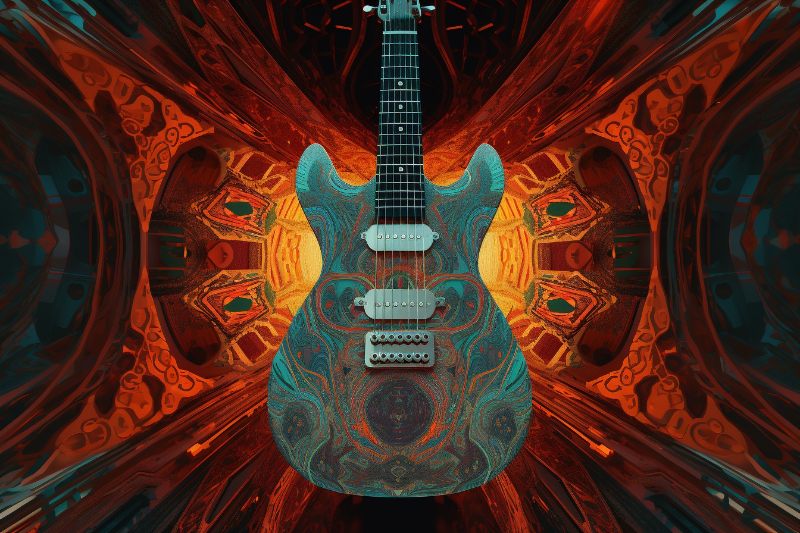
Future of AI in Music
The evolution of AI in music is a dynamic and ongoing journey, marked by constant progress and innovations on the horizon. As technology advances at an accelerated pace, we can anticipate a series of thrilling developments in AI music tools.
These forthcoming advancements are poised to expand the horizons for musicians and bring about a transformative shift in the music creation and listening experience.
The future of AI in music holds the potential for even more personalized musical interactions, seamless real-time collaboration between artists and AI, and increased accessibility to music production for a broader audience.
The impact of AI on music is enduring, and its influence is on an upward trajectory, promising continuous growth in the years ahead.
1. Personalized Music Experiences
The future of AI in music promises to bring us more personalized music experiences. AI algorithms will become increasingly sophisticated in analyzing our listening habits, preferences, and moods.
This advancement will empower music streaming platforms to craft playlists and suggestions finely attuned to the unique preferences of every listener.
Picture a scenario where your music selection adjusts to your daily mood effortlessly, smoothly shifting from tranquil melodies in the morning to lively beats in the evening.
2. Real-Time Collaboration with AI
The collaboration between artists and AI is set to become even more seamless and dynamic. In the future, AI will facilitate real-time collaboration between musicians and AI systems.
Artists will be able to compose, produce, and experiment with AI-generated musical elements during live sessions or studio recordings.
This will bridge geographical gaps, allowing artists from different parts of the world to collaborate effortlessly. AI will act as a creative partner, instantly generating musical ideas and adapting to artists' creative visions in real time.
3. AI-Enhanced Live Performances
AI will play a significant role in enhancing live music performances. Musicians will harness AI to create immersive and unforgettable live shows.
AI-driven systems will synchronize lighting, visuals, and other sensory elements with the music, creating a multisensory experience for concertgoers.
Imagine attending a live concert where dynamic lighting effects, holographic visuals, and AI-generated visuals are seamlessly integrated into the performance, taking live music to a whole new level.
4. Accessible Music Production
One of the highly anticipated upcoming trends in AI music involves making music production more accessible to a broader audience.
AI-powered composition tools will become increasingly available, catering to the needs of aspiring musicians and individuals without a musical background alike.
User-friendly interfaces and AI-generated musical elements will enable anyone with a creative spark to start producing music effortlessly.
This will break down barriers to entry in the music industry, empowering a new generation of music creators to express themselves through AI-assisted music production.
5. AI-Infused Genres
AI's influence on music genres will continue to evolve, giving rise to entirely new and unconventional styles. Musicians and producers will experiment with AI-generated music that defies traditional genre categorization.
These AI-infused genres will blend elements from various musical styles, resulting in innovative and captivating sonic experiences.
We can expect to see the emergence of music that pushes the boundaries of what we consider possible, opening up new horizons for creativity and exploration in the world of music.
Empress: Your Creative Companion
Ready to explore the world of AI in music? Empress offers a comprehensive suite of AI-driven music tools, from composition to marketing. Visit the Empress website and unlock the boundless potential of AI in your musical endeavors.
FAQs:
Q1: How does AI assist in music composition?
AI tools provide chord progressions, melodies, and lyrics, serving as creative catalysts for musicians.
Q2: Are AI-generated compositions unique?
Yes, AI-generated compositions are unique and can be customized to fit the artist's vision.
Q3: Are AI-generated compositions truly original?
Yes, AI-generated compositions can be original, but they often draw from existing musical influences. AI serves as a creative collaborator, blending familiar elements into new and unique compositions.
Q4: Are AI music composition limited to specific genres?
No, AI music composition tools are versatile and can generate music in a wide range of genres and styles. They can adapt to various musical preferences and create compositions that span different genres, ensuring flexibility and creativity in music production.
Q5: What benefits do Empress AI tools offer musicians?
Empress AI tools provide a wide range of benefits, from jumpstarting creativity with chord and melody generation to streamlining marketing efforts with SEO tags and captions. They empower musicians to enhance their craft and reach wider audiences.
Follow the future of music with Empress. Check out our blog to learn how you can effectively use these AI music tools.
